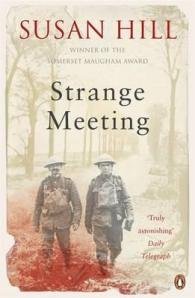Susan Hill’s novel set in World War One takes its name from a Wilfred Owen poem – Strange Meeting – but, as she says in an author’s afterword, there’s very little else to connect the novel and poem together.
Written in 1971, it tells the story of John Hilliard, a soldier who, in the first few pages, is wounded and returns to England. He spends a little time there, then goes back to the front where he meets David Barton, a new officer yet to experience battle. The two of them become very close; at some points it seems that they’re in a romantic relationship – indeed, there is a declaration of love but whether it is romantic or not is up for some question. Barton is described, by Hilliard’s narration, as an almost ethereal being. Untouched by the front lines when they meet, Barton seems to be that youthful naivete that can simply brush off the horrors of war, not because he believes unquestioningly – he doesn’t – but because he sort of drifts over the world instead of truly engaging with it. His letters home tell the unvarnished truth, but in an almost cheerful way. By contrast, Hilliard struggles to cope at all and comes to rely on Barton to confide his fears.
The relationship is quite an interesting one, but I felt that Hill had too much distance. The tone created is very much one of the era – that restrained, refined conversation which in great works of fiction is hiding a turmoil of emotions underneath the surface that at some point breaks through, if only briefly. I’m thinking of the The Remains of the Day and Brief Encounter, though those are set a little later, and Forster’s work. In Hill’s, I didn’t get the undercurrent of emotion that I was looking for. Instead, I felt that there was just the restraint. Yes, there is one point where they admit they love each other, but there was no change in their relationship afterwards, and I did feel that something so momentous would have an effect. Likewise as Barton gets more involved in battle and the realities of war, there wasn’t enough of a sense of change over time – he was suddenly withdrawn and struggling.
I think it also, to be fair, suffered from my incredible love of Pat Barker’s Regeneration. A phenomenal novel, I studied it at A-level and read the rest of the trilogy, and adored it. That does have the seething torrent beneath the emotion. The image of Rivers sitting next to the fire, watching Sassoon – “it happens” – discussing the love men have for officers as father figures, is one that sticks with me and resonates throughout the novel. There’s the underlying themes of poetry, politics, the purpose of literature, whether love should be spoken of and whether if you love someone you can justify sending them to war, and in Hill’s, it just felt far too narrow. I like the sweeping questions literature can pose and, sadly, like The Woman In Black, it proved too narrow in scope for my liking.
3/5
